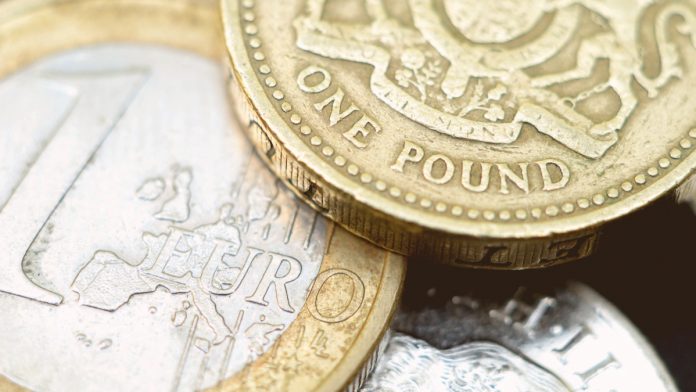After a stronger start to the previous week, the pound lost ground towards the end of the week. The pound euro exchange rate fell for a third consecutive session on Friday. The pair finished the week at €1.1624, just 0.05% higher than where it started the previous week. The pound was edging higher in early trade on Monday.
| What do these figures mean? |
|---|
| When measuring the value of a pair of currencies, one set equals 1 unit and the other shows the current equivalent. As the market moves, the amount will vary from minute to minute. If the euro amount increases in this pairing, it’s positive for the pound. Or, if you were looking at it the other way around:1 EUR = 0.87271 GBPIn this example, €1 is equivalent to approximately £0.87. This measures the euro’s worth versus the British pound. If the sterling number gets larger, it’s good news for the euro. |
Data showing the strongest manufacturing activity in 13 months boosted the pound early in the previous week. However, the pound was unable to maintain it strength, amid dire U.K. service sector numbers and growing Brexit uncertainty.
Brexit pessimism weighed on demand for sterling. The House of Commons failed to ease the Brexit deadlock, rejecting all four alternatives to U.K. Theresa May’s Brexit deal. Meanwhile Theresa May, started talks with the leader of the opposition party, Jeremy Corbyn. A cross party agreement appears to be the only way that any form of Brexit deal will be passed through Parliament.
Theresa May has requested an extension to Article 50 until 30th June. Pound investors were inititally unimpressed with developments and the pound moved lower. Brussels have previously indicated that they favour a longer extension of 9-12 months. But, for example, France are opposing any extension without a clear plan from Theresa May on how to move forward. All 27 member states must agree to the extension.
Today the House of Lords is due to vote on Yvette Cooke’s Brexit Bill. The bill ensures that the U.K. cannot leave the EU without a deal. If the Lords pass the bill the pound could move higher.
| Why is a “soft” Brexit better for sterling than a “hard” Brexit? |
|---|
| A soft Brexit implies anything less than UK’s complete withdrawal from the EU. For example, it could mean the UK retains some form of membership to the European Union single market in exchange for some free movement of people, i.e. immigration. This is considered more positive than a “hard” Brexit, which is a full severance from the EU. The reason “soft” is considered more pound-friendly is because the economic impact would be lower. If there is less negative impact on the economy, foreign investors will continue to invest in the UK. As investment requires local currency, this increased demand for the pound then boosts its value. |
Eyes Towards The ECB
The euro was broadly out of favour in the previous week. Data showing the German manufacturing activity dropped to a 69-month low, hit demand for the euro. German factory orders slumping by –4.2% also knocked the mood for the common currency. Concerns over the health of Germany’s economy amid Brexit and slowing global growth continue to linger. With data for the eurozone’s largest economy showing few signs of improving, the European Central Bank (ECB) will be in no rush to raise interest rates.
The ECB is due to make its monetary policy announcement on Wednesday. Analysts are not expecting any change to the current monetary policy in the eurozone. However, a more cautious tone, given the weak data could send the euro lower.
| Why do raised interest rates boost a currency’s value? |
|---|
| Interest rates are key to understanding exchange rate movements. Those who have large sums of money to invest want the highest return on their investments. Higher interest rate environments tend to offer higher yields. So, if the interest rate or at least the interest rate expectation of a country is relatively higher compared to another, then it attracts more foreign capital investment. Large corporations and investors need local currency to invest. More local currency used then boosts the demand of that currency, pushing the value higher. |
This publication is provided for general information purposes only and is not intended to cover every aspect of the topics with which it deals. It is not intended to amount to advice on which you should rely. You must obtain professional or specialist advice before taking, or refraining from, any action on the basis of the content in this publication. The information in this publication does not constitute legal, tax or other professional advice from TransferWise Inc., Currency Live or its affiliates. Prior results do not guarantee a similar outcome. We make no representations, warranties or guarantees, whether express or implied, that the content in the publication is accurate, complete or up to date. Consult our risk warning page for more details.
This article was initially published on TransferWise.com from the same author. The content at Currency Live is the sole opinion of the authors and in no way reflects the views of TransferWise Inc.





